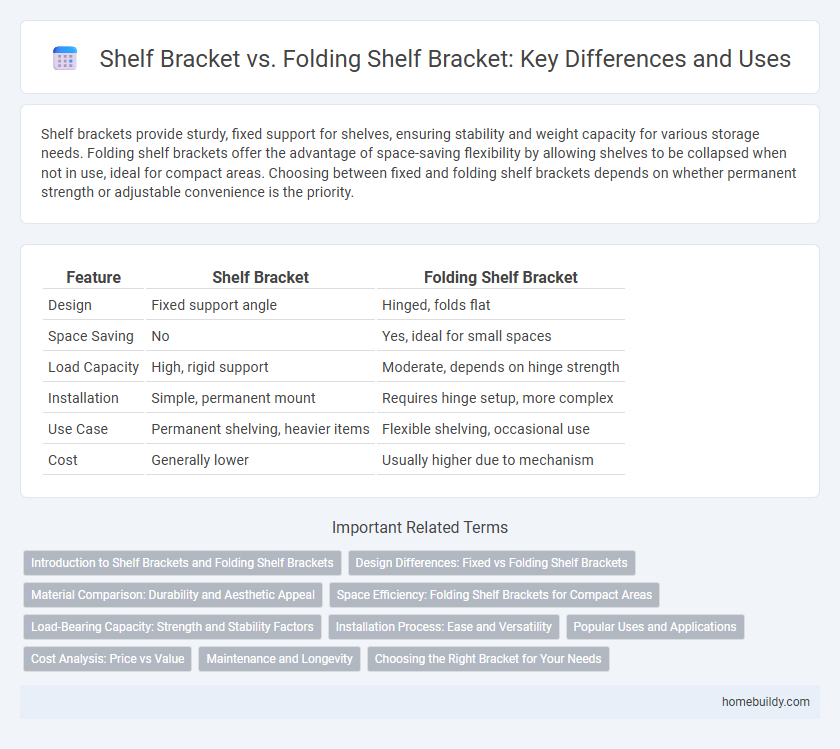Shelf brackets provide sturdy, fixed support for shelves, ensuring stability and weight capacity for various storage needs. Folding shelf brackets offer the advantage of space-saving flexibility by allowing shelves to be collapsed when not in use, ideal for compact areas. Choosing between fixed and folding shelf brackets depends on whether permanent strength or adjustable convenience is the priority.
Table of Comparison
| Feature | Shelf Bracket | Folding Shelf Bracket |
|---|---|---|
| Design | Fixed support angle | Hinged, folds flat |
| Space Saving | No | Yes, ideal for small spaces |
| Load Capacity | High, rigid support | Moderate, depends on hinge strength |
| Installation | Simple, permanent mount | Requires hinge setup, more complex |
| Use Case | Permanent shelving, heavier items | Flexible shelving, occasional use |
| Cost | Generally lower | Usually higher due to mechanism |
Introduction to Shelf Brackets and Folding Shelf Brackets
Shelf brackets provide sturdy support for fixed shelves, typically made from metal or wood, designed to bear significant weight and maintain a permanent position. Folding shelf brackets incorporate a hinge mechanism allowing the shelf to be collapsed against the wall, optimizing space in compact environments. Both types vary in load capacity, installation methods, and ideal usage scenarios, with folding brackets favored for versatile or temporary setups.
Design Differences: Fixed vs Folding Shelf Brackets
Shelf brackets are typically fixed in design, providing permanent support for shelves with a sturdy, rigid structure that mounts securely to walls. Folding shelf brackets feature a hinged mechanism allowing the bracket to be collapsed against the wall when not in use, optimizing space in small or multifunctional areas. The design difference impacts weight capacity and versatility, with fixed brackets offering greater load-bearing strength while folding brackets enhance flexibility and space-saving functionality.
Material Comparison: Durability and Aesthetic Appeal
Shelf brackets are commonly made from steel, aluminum, or plastic, offering high durability and a sturdy support for heavy loads, while folding shelf brackets often use steel or stainless steel for enhanced durability and rust resistance in compact designs. Steel shelf brackets provide excellent load-bearing capacity and a rugged industrial look, whereas folding brackets combine durability with sleek, space-saving aesthetics, ideal for modern interiors. Both materials ensure long-lasting performance, but folding brackets typically offer more versatility in style and function due to their hinged construction.
Space Efficiency: Folding Shelf Brackets for Compact Areas
Folding shelf brackets maximize space efficiency by allowing shelves to be collapsed when not in use, making them ideal for compact areas such as small kitchens, workshops, or laundry rooms. Unlike fixed shelf brackets, folding designs provide flexibility by freeing wall space and minimizing clutter. This adaptability enhances room functionality without compromising the strength needed to support various shelf loads.
Load-Bearing Capacity: Strength and Stability Factors
Shelf brackets typically offer higher load-bearing capacity due to their fixed design and robust construction, providing superior strength and stability for heavy items. Folding shelf brackets incorporate hinges allowing them to fold flat, which can reduce overall load support and stability compared to fixed brackets. Material composition and mounting hardware significantly influence the load-bearing performance of both types, with steel brackets generally outperforming aluminum or plastic variants.
Installation Process: Ease and Versatility
Shelf brackets offer straightforward installation with fixed mounting points, providing stable support for permanent shelving. Folding shelf brackets feature a hinge mechanism that requires slightly more precise alignment but allow for versatile, space-saving applications where shelves can be collapsed when not in use. Both types accommodate standard wall anchors and screws, but folding brackets require additional steps to ensure smooth operation and secure locking.
Popular Uses and Applications
Shelf brackets are commonly used for fixed shelving in closets, garages, and retail displays, providing stable support for everyday storage needs. Folding shelf brackets offer versatile applications in small spaces such as workshops, RVs, and laundry rooms where temporary or adjustable shelving is essential. Both types accommodate weight-bearing requirements, but folding brackets excel in environments demanding space-saving flexibility and quick shelf adjustments.
Cost Analysis: Price vs Value
Shelf brackets generally offer a lower initial cost compared to folding shelf brackets, making them suitable for budget-conscious projects. Folding shelf brackets provide greater versatility and space-saving functionality, which can justify their higher price through enhanced long-term value. Evaluating the balance between upfront expenses and practical benefits helps determine the most cost-effective choice for specific shelving needs.
Maintenance and Longevity
Shelf brackets typically require minimal maintenance due to their fixed design, reducing wear and tear over time. Folding shelf brackets incorporate hinges and moving parts that may need regular lubrication and inspection to prevent rust and ensure smooth operation. The fixed shelf bracket generally offers greater longevity as it experiences less mechanical stress compared to the folding variant.
Choosing the Right Bracket for Your Needs
Shelf brackets provide sturdy, fixed support ideal for heavy items or permanent shelving installations, ensuring maximum stability and load-bearing capacity. Folding shelf brackets offer versatility by allowing shelves to be easily collapsed, making them suitable for limited spaces or multifunctional areas where flexibility is essential. Evaluating the intended shelf use, weight requirements, and space constraints will determine whether a fixed shelf bracket or a folding shelf bracket best meets your unique storage needs.
Shelf bracket vs Folding shelf bracket Infographic

 homebuildy.com
homebuildy.com